Love for sale, appetizing young love for sale...
Driva' man he made a life
But the Mamie ain't his wife
Choppin' cotton, don't be slow
Betta finish out ya row
Keep a-movin' with that plow
Driva' man'll show ya how
Get to work and root that stump
Driva' man'll make you jump
Better make your hammer ring
Driva' man'll start to swing
Ain't but two things on my mind
Driva' man and quittin' time
Driva' man the kinda boss
Ride a man and lead a hoss'
When his cat-o'-nine-tails fly
You'd be happy just to die
Runaway and you'll be found
By his big old red bone hound
Pateroller, bring ya back
Make ya sorry you is black
Driva' man he made a life
But the Mamie ain't his wife
Ain't but two things on my mind
Driva' man and quittin' time
Driva' man he made a life
But the Mamie ain't his wife
Choppin' cotton, don't be slow
Betta finish out ya row
Keep a-movin' with that plow
Driva' man'll show ya how
Get to work and root that stump
Driva' man'll make you jump
Better make your hammer ring
Driva' man'll start to swing
Ain't but two things on my mind
Driva' man and quittin' time
Driva' man the kinda boss
Ride a man and lead a hoss'
When his cat-o'-nine-tails fly
You'd be happy just to die
Runaway and you'll be found
By his big old red bone hound
Pateroller, bring ya back
Make ya sorry you is black
Driva' man he made a life
But the Mamie ain't his wife
Ain't but two things on my mind
Driva' man and quittin' time
inviata da Carles viadelo mestre - 23/1/2008 - 18:33
these lyrics are wrong out of order and not phonetic nor are they properly spelt.
Xinnia - 29/8/2013 - 21:44
Aveva ragione Xinnia nell’ormai lontano agosto 2013: il testo proposto nel 2008 da Carles Viadelo Mestre è completamente disordinato e scorretto.
Ecco il testo corretto come verificato all’ascolto dal video di una bellissima esecuzione dal vivo nel 1964, con Max Roach alla batteria, Clifford Jordan al sassofono tenore, Coleridge Perkinson al pianoforte, Eddie Khan al contrabbasso e la splendida, intensa voce di Abbey Lincoln.
“Driva' Man si apre con il canto straziato della Lincoln che racconta le violenze e le molestie sessuali di cui erano vittime le schiave di colore da parte dei padroni bianchi nelle piantagioni fino a pochi anni prima.” (it.wikipedia)
Il verso introduttivo è quello con cui si apre una famosa canzone scritta da Cole Porter nel 1930 e resa immortale nelle versioni di artisti come Billie Holiday ed Ella Fitzgerald.
Questo magnifico brano è stato recentemente ripreso da Brittany Howard degli Alabama Shakes in un album collettivo intitolato “Music from and Inspired by 12 Years a Slave”, un progetto musicale complementare ed integrativo alla colonna sonora del film “12 Years a Slave” (“12 anni schiavo”) diretto nel 2013 dal regista inglese Steve McQueen (quello di “Hunger”, per intenderci).
Ecco il testo corretto come verificato all’ascolto dal video di una bellissima esecuzione dal vivo nel 1964, con Max Roach alla batteria, Clifford Jordan al sassofono tenore, Coleridge Perkinson al pianoforte, Eddie Khan al contrabbasso e la splendida, intensa voce di Abbey Lincoln.
“Driva' Man si apre con il canto straziato della Lincoln che racconta le violenze e le molestie sessuali di cui erano vittime le schiave di colore da parte dei padroni bianchi nelle piantagioni fino a pochi anni prima.” (it.wikipedia)
Il verso introduttivo è quello con cui si apre una famosa canzone scritta da Cole Porter nel 1930 e resa immortale nelle versioni di artisti come Billie Holiday ed Ella Fitzgerald.
(il testo corretto è stato sostituito)
Questo magnifico brano è stato recentemente ripreso da Brittany Howard degli Alabama Shakes in un album collettivo intitolato “Music from and Inspired by 12 Years a Slave”, un progetto musicale complementare ed integrativo alla colonna sonora del film “12 Years a Slave” (“12 anni schiavo”) diretto nel 2013 dal regista inglese Steve McQueen (quello di “Hunger”, per intenderci).
Bernart Bartleby - 14/2/2015 - 16:29
×
![]()

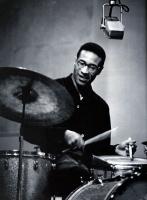
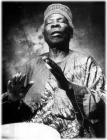
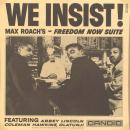





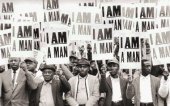

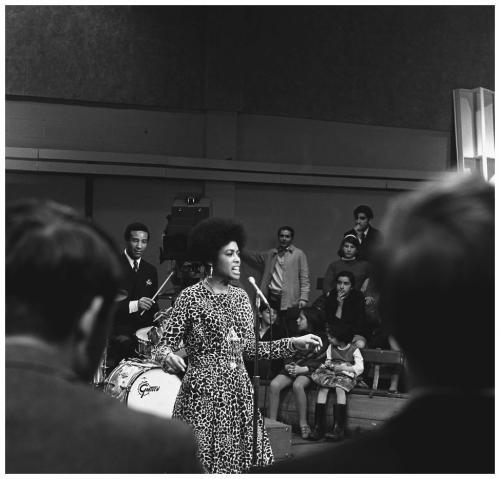
Music by Max Roach
"We Insist! Freedom Now", al quale parteciparono musicisti del calibro di Abbey Lincoln, Coleman Hawkins e Olatunji, è un disco seminale, colonna sonora del movimento per i diritti civili degli afro-americani che nel 1960 era nel periodo di massimo fulgore:
"[...] Nel 1960 Roach compose e incise per la Candid 'We Insist! Freedom Now Suite', un lavoro basato sui testi del poeta e cantante Oscar Brown, Jr e scritto in occasione del centenario della "proclamazione di emancipazione" di Abraham Lincoln. Un'operazione così esplicita, per l'epoca (anche per quanto riguarda la copertina del disco, veramente provocatoria), contribuì all'inserimento di Roach nella 'lista nera' dell'industria discografica americana nella seconda metà degli anni Sessanta, e lo costrinse a diradare la sua presenza in studio d'incisione. [...]"
(La citazione in questa introduzione è tratta da it.wikipedia).
Original liner notes
1. "Driva Man" – 5:10
2. "Freedom Day" – 6:02
3. "Triptych: Prayer/Protest/Peace" – 7:58
4. "All Africa" – 7:57
5. "Tears for Johannesburg" – 9:36
I "paterollers" (patrollers), le pattuglie, che appaiono nelle parole di Driva' Man erano, secondo la descrizione di un ex schiavo, uomini "che ti acchiappavano e ti riportavano dal padrone. Molti di questi patrollers erano bianchi poveri. Questi bianchi dovevano ingegnarsi per guadagnarsi da vivere, quindi si mettevano al servizio dei padroni di schiavi, pattugliavano le strade di notte e ti frustavano se ti trovavano fuori dalla piantagione senza un lasciapassare."
Nella sua emozionante performance Coleman Hawkins al sax suona la controparte maschile alla voce di Abbey Lincoln.
traduzione parziale delle note di copertina di Nat Hentoff
The “paterollers” (patrollers) that figure in the lyrics to DRIVA’ MAN were described by another former slave as men “who would catch you from home and wear you out and send you back to your master…Most of them there patrollers was poor white folks…Poor white folks had to hustle round to make a living so they hired out theirselves to slaveowners and rode the roads at night and whipped you if they catched you off their plantation without a pass.”
In this intensely expressive performance, Coleman Hawkins plays the male counterpart to Abbey Lincoln. Hawkins was intrigued by the work as a whole and stayed long after his own part was finished. He kept turning to Max Roach, commenting on the strong, bold melodies. “Did you really write this, Max?” Hawkins kep asking. “My, my!” Abbey Lincoln’s fiery strength and hard clarity were a revelation to me after having heard her on several albums which lacked definition. “I feel this,” she explained, “and I’ve also learned a lot from Max Roach in recent months about being me when I sing.” It is Coleman Hawkins who solos after Abbey’s opening. There was a squeak in this, his best take. “No, don’t splice,” said Hawkins. “When it’s all perfect, especially on a piece like this, there’s something very wrong.”
original liner notes by Nat Hentoff